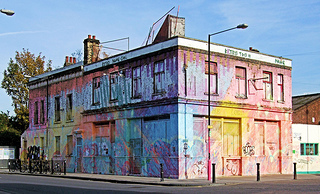The government has announced that it is considering making changes to planning legislation to protect pubs which are considered ACV, or "Assets of Community Value". ACV-listed pubs will, should the changes go through, require planning permission to change their use or demolish them.

Image by Jim Linwood
What Does ACV Mean Exactly?
So, we know that "ACV" refers to an "Asset of Community Value", but what does that mean – and how does that relate to pubs?
ACV refers to land or property that is particularly important to the local community. A good example of a particularly significant ACV is Old Trafford football stadium, which has incredible economic and cultural importance to the area.
Once a property is ACV-listed, the community gains the community right to bid on it. This means that, should there be a change of ownership or threat of closure relating to a property which is ACV-listed, local communities are given extra time to plan a bid on the property and to raise the funds with which to buy the property.
The idea is that there is a real benefit to be had from the continued operation of certain properties that act as hubs for the local community – such as a pub, for instance! However, local communities often don't have the funds to make a bid quickly enough when they're competing with private interests. The ACV gives them that time.
In addition, the new government changes to planning law that have been proposed would mean that ACV-listed pubs will now require planning permission before undergoing a change of use or being demolished.
Why Pubs, And Why Now?
At least 100 community pubs have been ACV-listed, according to government sources.
Pubs, especially small community-focussed pubs which are most likely to be ACV-listed have been struggling under a great deal of pressure from a number of sources lately.
The ending of the 'beer tie', though, earlier this year, represents a substantial step towards addressing some of these issues, and seeking to halt the declining numbers of British pubs.
In this political climate, it looks as though small British pubs in particular are now seen as something to cherish and maintain, with the government taking many steps to safeguard and protect their continued existence.
The proposed changes to planning permission law that protect pubs from change of use or demolition are entirely in keeping with that spirit.
The Localism Act 2011
The Localism Act 2011 (from which ACV-listing originates) has been controversial not because of its changes, but because of what has stayed the same.
Jules Pipe, Mayor of Hackney lays out his concerns in the Guardian, claiming:
The Localism Act does not challenge the deep-rooted centralisation in the UK; and London, like other British cities, is forced to depend on central grants, often with strings, for 95% of spending. Other global cities have more autonomy. New York controls 67% of its funds and Paris 83%. This isn't just frustrating, it risks the ability of cities to grow and meet the demands of a global city.
This expansion of the significance of ACV-listing would form the first part of a government response to these critics – as long as the trend continues.
A Force For Good?
It looks like these changes to the role of ACV-listing could be, overall, a force for good. However, in many cases running a pub in the current economy is unsustainable. A pub owner who is struggling and losing money could find it difficult to either sell their pub for a fair price or continue supporting and maintaining the pub. Community ownership could be a temporary measure, but it won't always fix the core problems.
Ultimately, the benefits of the new system will need to be looked at on a case by case basis. There may well be problems and obstacles that are unforeseen or unfair, and these will need to be taken into account. We're sure the system will continue to be refined between now and the date when (if) the new rules come into force, and beyond.
